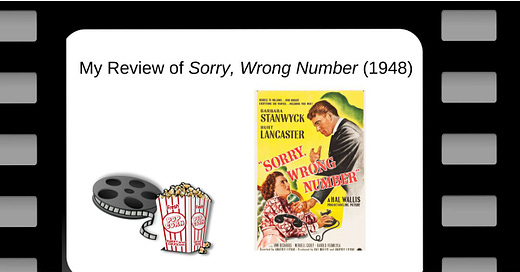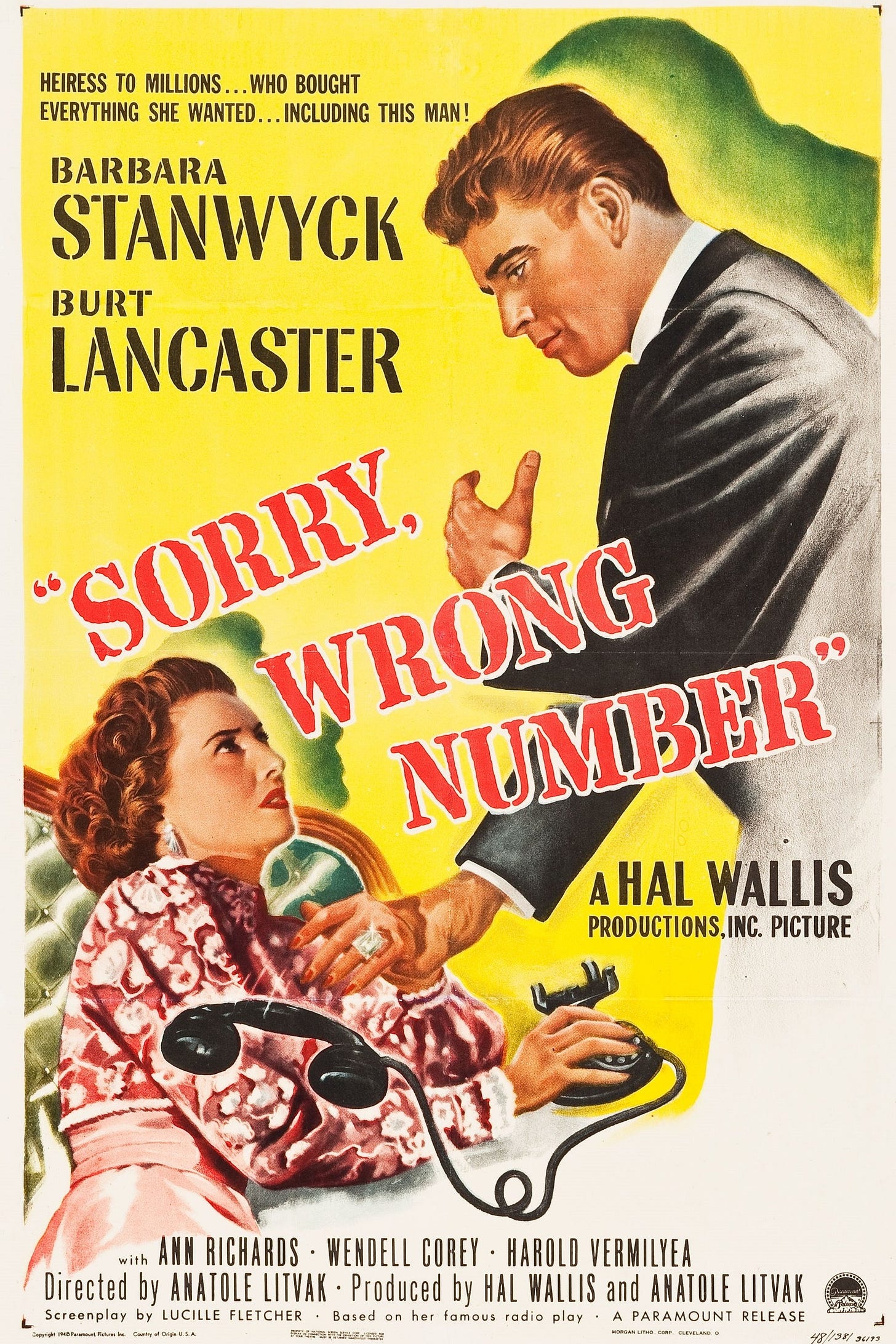Hi today. I’m reviewing Sorry, Wrong Number. I got to tell, you this movie. The first I saw it, I only saw the end, so I was like, “Oh my God. So she overhears a plot on the phone and somebody’s there to kill her. What happens during the rest of the movie? I don’t know. I don’t know if I want to watch this. This is really depressing.”
Anyway, I ended up watching the movie. And I got to tell you, I was really surprised by how much I liked it. This is actually a really, really good film. It has all these flashbacks. What happens is Barbara Stanwyck plays this woman. She’s purportedly bedridden with a heart condition, we find out later. At the time, we don’t know that. We just know that she’s in bed and she feels. (We have no idea why she’s bedridden. Are her motor skills impaired or does she have a chronic illness or what?) But she can get up and walk around.
That’s what really kills me. She can get up and walk around. So I’m noticing all this and like, okay. So then she overhears, while she’s on the phone trying to call her husband, Henry (played by Burt Lancaster), she overhears two people talking on what I guess is a party line. Somehow their wires get crossed, as she puts it. Anyway, she overhears a murder plot. A woman is supposed to be killed at a certain time, 11:15 or something like that. It’s amazing how precise they’re being here, and in any case, when the train goes by, that way, nobody will hear her screams. So anyway, she’s on the phone hearing this and she’s trying to convince everybody that she can call that something’s going on, something terrible. And through a series of phone calls, you get a series of flashbacks. You get the flashback from Sally the Nice Girl (played by Ann Richards) the woman she basically took Henry away from.
She (Leona played by Barbara Stanwyck) married Henry. Henry was this woman’s boyfriend, whatever, significant other. She [Sally the Nice Girl] ends up married to the district attorney instead. She finds out, actually through subterfuge that he’s involved in a case that’s focused on Henry, something that Henry is doing. So the bottom line is, the interesting part of this movie, I think along with all of the flashbacks and the way it’s told, and the ultimate conclusion is that really this is a very feminist film, if you think about it.
It just goes to show what happens when somebody overcompensates, treats a child like she’s a child into her adulthood, indulges her every need, buys anything for her, buys anyone for her. It’s like she can’t take responsibility as an adult. She is incapable of rationally dealing with problems, and she lashes out like a 2-year-old when she gets mad. Now, to me, this person has been stuck in childhood by her father’s overindulgence, and to me, the real hero of this story are the people who come–
For instance, Sally, that’s the woman who she (Leona) stole her boyfriend from. The one who married the district attorney. She’s like a hero to me because she’s the one out there investigating and getting some of the facts, and ultimately [Barbara Stanwyck] finds out that she is the intended victim and Henry tries to call her at the last minute when he realizes he doesn’t have to pay the money after all. [Because he stole from his father-in-law’s company, because he was going nowhere in that job. And any suggestion that Burt/Henry leave and find other employment is met with a Major League Meltdown from Leona the Spoiled Hypochondriac.] But the idea was to kill her for the insurance money because he owes a lot of money to somebody because he’s involved in a criminal enterprise. I think I’ve said just about enough, and I just really, really liked this movie for a lot of reasons.
I mean, it’s just well told. There are a lot of twists and turns. The characters are interesting and she’s a piece of work, but you can understand why when you look at what kind of situation she was raised in, spoiled rotten by this father of hers to the point where she can throw a tantrum that causes symptoms of a heart attack. It’s ridiculous.
It’s like, don’t do this to your kids. Don’t do this to your daughters, for heaven’s sake. You have to be able to take care of yourself. That’s the message here. And if somebody’s coming there to kill you, get the hell out of bed. I don’t care how sick you think you are, you’re going to be dead otherwise. Alright, that’s it and I will talk to you later. Thank you.
*****
Directed by Anatole Litvak
Screenplay by Lucille Fletcher (based on the 1943 radio play by Lucille Fletcher)
Produced by Anatole Litvak and Hal B. Wallis
And here’s the trailer:
I’d say it’s filled with spoilers, if I hadn’t already spoiled it for you.
And are they really spoilers? Would anyone really be surprised about who the intended victim was? 🙂














Share this post